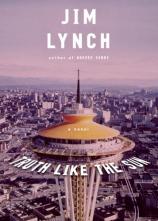Truth Like the Sun
Review
Truth Like the Sun
One of the concerns prompted by the rise of the Internet is whether it undermines the ability of newspapers to hold political leaders to account. This fear is one of the main subtexts of TRUTH LIKE THE SUN, former journalist Jim Lynch’s entertaining tale of politics, backroom deals, and the murky practices that politicians and journalists justify as being in the public interest.
"...[an] entertaining tale of politics, backroom deals, and the murky practices that politicians and journalists justify as being in the public interest.... TRUTH LIKE THE SUN is a fast-paced work and a terrific example of what a political novel can be."
The novel’s 22 chapters alternate between 1962 at the time of the Seattle World’s Fair and 2001, months before the terrorist attacks. Roger Morgan --- who, one assumes, is not based on Ewen Dingwall, the actual organizer of the World’s Fair --- is a 31-year-old rising star in Seattle politics. Thanks to his stewardship, the Fair becomes not the financial disaster many had predicted but an enormous international success. The event attracts millions of visitors to a young city aspiring to greatness, including dozens of celebrities. Count Basie, Edward R. Murrow, John Glenn and Ed Sullivan are among the many notables who have cameos in the book, as does Elvis Presley, portrayed here as a soft-spoken country boy who wants nothing more than to enjoy a quiet night of drinking and playing cards.
Card games played for money in the back rooms of the city’s seedier clubs, however, are among Morgan’s many secrets. Even as he becomes prominent as an adviser to candidates running for office, the public knows little about him. Details about his past are sketchy, including his family life and his business relationship with a property developer named Malcolm Turner. When, in 2001, the 70-year-old decides to run for mayor of Seattle, observers can’t help wondering why a well-known public figure would have waited so long to seek public office.
Helen Gulanos, a young reporter and single mother newly arrived from Ohio, wonders about this, too. She stops work on her series about the dot-com bust to investigate Morgan’s past. The information she unearths threatens to derail a candidacy that generates much enthusiasm across all generations and inspires hope that, in electing a great man like Morgan, the city can reclaim some of the appeal that recent spates of violence and the economic downturn have taken away.
But Gulanos has secrets as well. In moving west, she left behind not just a reputation for bringing down politicians but also a private life filled with questionable choices, such as the extent to which she’ll go to gain access to sources. These choices raise doubts among colleagues skeptical of her abilities and give Morgan’s team ammunition to preserve his candidacy and keep from the public the secrets he’s trying to protect.
TRUTH LIKE THE SUN is a fast-paced work and a terrific example of what a political novel can be. It raises moral questions, such as whether shady business dealings are justified if the results serve a greater good, without offering answers. Lynch builds tension well. The scenes in which Gulanos grills Morgan for information are especially fine. At first gentlemanly to a fault, Morgan eventually responds to her aggressive behavior with pointed questioning of his own, until you’re not quite sure who is investigating whom. Their exchanges are among the novel’s most thrilling moments.
Aside from the final few pages, in which an attempt at pathos is forced, my only complaint is the author’s apparent suggestion about the fortunes of the press. One assumes from the tone of this book that Lynch, like a lot of us, is worried about the press’s ability to conduct investigations in an age of free content. That he set the more modern scenes in 2001, as the Internet began siphoning off the fourth estate’s readers and advertising revenues --- Craigslist expanded nationwide in 2000 --- suggests a fear that technology is robbing newspapers of their ability to carry on this kind of scrutiny. One wonders, though, why no one investigated Morgan in the 39 years between 1962 and 2001, well before the Internet’s influence. There are many reasons to worry about the press’s decline --- if that is, in fact, what we are witnessing --- but I wish Lynch’s take on this theme had been more nuanced and more fully explored.
But this is a minor criticism of an otherwise fun and thoughtful novel. The title comes from a quote attributed to Elvis: “Truth is like the sun. You can shut it out for a time, but it ain’t going away.” That’s a perfect description of the book’s message: No one can hide his or her past for long.
Reviewed by Michael Magras on April 13, 2012
Truth Like the Sun
- Publication Date: April 10, 2012
- Genres: Fiction
- Hardcover: 272 pages
- Publisher: Knopf
- ISBN-10: 030795868X
- ISBN-13: 9780307958686





